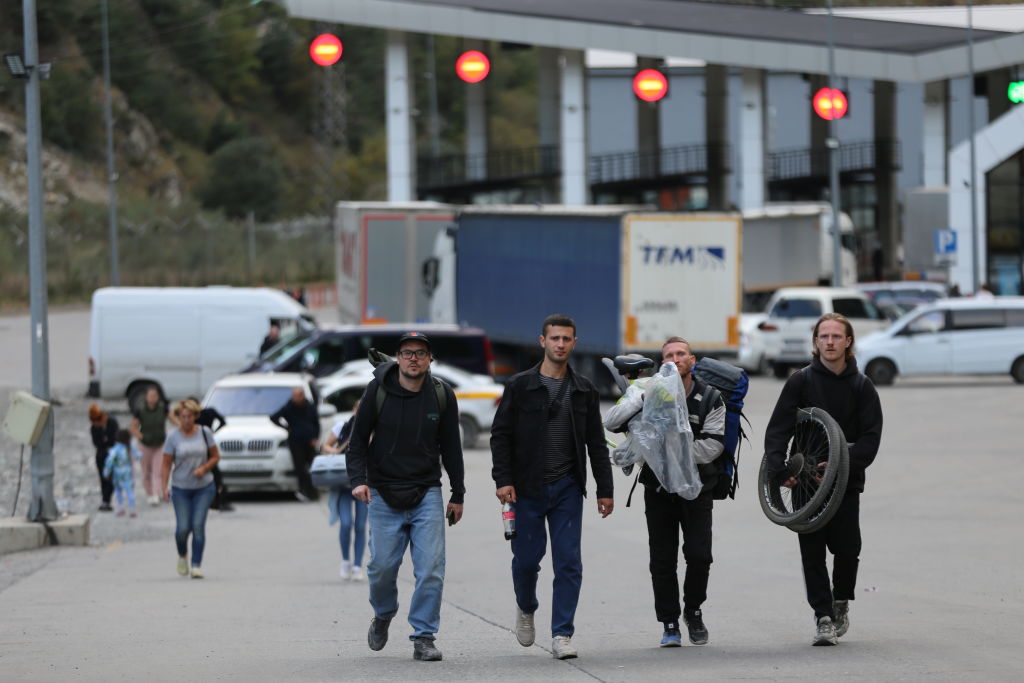More Russian men have now fled Putin's draft than fought in Ukraine, U.K. military intelligence says


A free daily email with the biggest news stories of the day – and the best features from TheWeek.com
You are now subscribed
Your newsletter sign-up was successful
In the seven days since Russian President Vladimir Putin "announced the 'partial mobilization' there has been a considerable exodus of Russians seeking to evade call-up," Britain's Ministry of Defense said in its early Thursday intelligence assessment. The exact number of fleeing Russians is "unclear," but "it likely exceeds the size of the total invasion force Russia fielded in February 2022."
Putin's initial invasion force included about 130,000 troops. More than 197,000 Russians have already fled through land borders to Georgia, Finland, Kazakhstan, and Mongolia since Sept. 21, The Associated Press reported Wednesday, and CNN says 10,000 are escaping into Georgia at one border crossing each day.
Those trying to leave Russia tend to be "better off and well educated," Britain's Defense Ministry said, "and the acceleration of 'brain drain' is likely to become increasingly significant" for Russia.
The Week
Escape your echo chamber. Get the facts behind the news, plus analysis from multiple perspectives.

Sign up for The Week's Free Newsletters
From our morning news briefing to a weekly Good News Newsletter, get the best of The Week delivered directly to your inbox.
From our morning news briefing to a weekly Good News Newsletter, get the best of The Week delivered directly to your inbox.
"Mobilization is another serious hit on the Russian economy" just as "oil and gas revenues are beginning to dry up" amid plunging energy prices, Maxim Mironov, a finance professor at Madrid's IE Business School, tells The Wall Street Journal. And the Russians escaping "are mainly highly skilled, educated workers. So this mobilization is going to have a severe economic effect not just for the next year but for decades."
Training, equipping, and paying 300,000 conscripts also requires a lot of money, the Journal adds. And "the Kremlin has dispatched still more forces" to Russia's borders, where FSB agents confront and in some cases stop "young Russian men trying to join an exodus out of the country," The New York Times reports. "While many Russians headed for the borders, others took to the streets," and "still others have attempted sabotage" at military recruitment centers.
Putin's "partial mobilization" was supposed to apply "only to those with military experience, but across Russia — and especially in remote areas and among ethnic minority groups — there were numerous reports of people with no experience being swept up," the Times reports. In fact, the Institute for the Study of War adds, "Russian military recruitment officials are openly contradicting the Kremlin's publicly stated guidelines for mobilization to meet quota requirements."
And Russian authorities "continue to send newly mobilized and undertrained recruits to directly reinforce severely degraded remnants of various units" in Ukraine, ISW reports. Ukraine's military said Wednesday night that Russia's fresh conscripts are arriving, clearly untrained, on the front lines in Donetsk.
A free daily email with the biggest news stories of the day – and the best features from TheWeek.com
Peter has worked as a news and culture writer and editor at The Week since the site's launch in 2008. He covers politics, world affairs, religion and cultural currents. His journalism career began as a copy editor at a financial newswire and has included editorial positions at The New York Times Magazine, Facts on File, and Oregon State University.
-
 The ‘ravenous’ demand for Cornish minerals
The ‘ravenous’ demand for Cornish mineralsUnder the Radar Growing need for critical minerals to power tech has intensified ‘appetite’ for lithium, which could be a ‘huge boon’ for local economy
-
 Why are election experts taking Trump’s midterm threats seriously?
Why are election experts taking Trump’s midterm threats seriously?IN THE SPOTLIGHT As the president muses about polling place deployments and a centralized electoral system aimed at one-party control, lawmakers are taking this administration at its word
-
 ‘Restaurateurs have become millionaires’
‘Restaurateurs have become millionaires’Instant Opinion Opinion, comment and editorials of the day
-
 The mission to demine Ukraine
The mission to demine UkraineThe Explainer An estimated quarter of the nation – an area the size of England – is contaminated with landmines and unexploded shells from the war
-
 The secret lives of Russian saboteurs
The secret lives of Russian saboteursUnder The Radar Moscow is recruiting criminal agents to sow chaos and fear among its enemies
-
 Is the 'coalition of the willing' going to work?
Is the 'coalition of the willing' going to work?Today's Big Question PM's proposal for UK/French-led peacekeeping force in Ukraine provokes 'hostility' in Moscow and 'derision' in Washington
-
 Ukraine: where do Trump's loyalties really lie?
Ukraine: where do Trump's loyalties really lie?Today's Big Question 'Extraordinary pivot' by US president – driven by personal, ideological and strategic factors – has 'upended decades of hawkish foreign policy toward Russia'
-
 What will Trump-Putin Ukraine peace deal look like?
What will Trump-Putin Ukraine peace deal look like?Today's Big Question US president 'blindsides' European and UK leaders, indicating Ukraine must concede seized territory and forget about Nato membership
-
 Ukraine's disappearing army
Ukraine's disappearing armyUnder the Radar Every day unwilling conscripts and disillusioned veterans are fleeing the front
-
 Cuba's mercenaries fighting against Ukraine
Cuba's mercenaries fighting against UkraineThe Explainer Young men lured by high salaries and Russian citizenship to enlist for a year are now trapped on front lines of war indefinitely
-
 Ukraine-Russia: are both sides readying for nuclear war?
Ukraine-Russia: are both sides readying for nuclear war?Today's Big Question Putin changes doctrine to lower threshold for atomic weapons after Ukraine strikes with Western missiles
